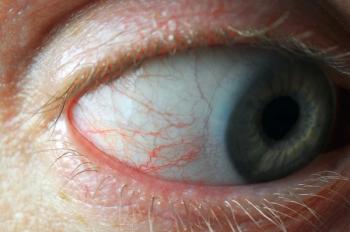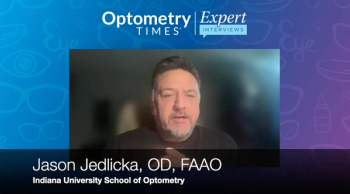
VEW 2024: What's available and what's to come regarding AMD treatment
Jeffry Gerson, OD, FAAO, details his Vision Expo West presentation "AMD A-Z" that he gave alongside Jessica Haynes, OD, FAAO.
Jeffry Gerson, OD, FAAO, of Grin Eye Care, and Jessica Haynes, OD, FAAO, took the 26 letters of the alphabet as a challenge. In their Vision Expo West presentation, "AMD A-Z," both current and future options for age-related macular degeneration treatment and diagnostic modalities were overviewed.
As for presentation takeaways, Gerson said it's not necessarily important what is discussed, but what attendees can take home. "Its going over enough different things that people can pick any part of it to choose to take back to the practice and use that one part," Gerson said. "So instead of having to adopt a whole new strategy, hopefully what we were able to do is give little bits and pieces that people can take back and choose from to implement something different."
Video transcript
Editor's note: This transcript has been lightly edited for clarity.
Jordana Joy:
Hi everyone. I'm here today with Jeffry Gerson of Grin Eye Care in Kansas. He is here to chat about his presentation, "AMD A-Z" at this year's Vision Expo West in Las Vegas, Nevada. So welcome. It's a pleasure to have you today.
Thank you. Thanks for having me.
Jeffry Gerson, OD, FAAO:
Of course. So first, could you give an overview of what you went over in your presentation?
Jordana Joy:
Yeah, so what's unique about this presentation, so the title is "AMD A-Z," and it's really kind of a rapid fire survey course where I pick something from each letter of the alphabet and we talk about that letter and something in AMD that starts with that letter. So sometimes it's a little bit of a challenge to find those 26 different things, but that's what we did. So just rapid fire about macular degeneration.
Joy:
Awesome. So what were a couple of those 26 segments of AMD?
Gerson:
Yeah, so as it turns out, there's more than 26 segments, because there's a couple letters we would do more than 1 about. So you know, some of it is stuff that you might already think you know or might be fairly aware about. An example would be some of the newer medications that are approved for wet macular degeneration. We also discuss some of the newer medications that are approved for geographic atrophy, which I think is super relevant, just because of them, number 1, being relatively new, and they're being direct to consumer marketing about them, so patients are asking about them. And then even talking about some things that are more kind of in the pipeline, for example, like photobiomodulation.
Joy:
In your personal experience and in your personal perspective, what are really those most exciting developments, either on the pipeline or currently available for AMD treatments?
Gerson:
Yeah, so I think as far as what's currently available, it's just for those patients of ours that have wet macular degeneration, the newer medications or reformulations of medications that allow for a longer time in between injections, so really decreasing the burden on patients. So we know that they work just as well as some of the medications that were maybe being injected once a month. But now maybe there's patients that only need to get their eyes injected every 3 months or so. So I think that's something that's something that's pretty exciting that is available today, along with, and we had already mentioned the geographic atrophy drugs, because, until fairly recently, there was no option. And so now we have 2 really good options. As far as pipeline, I would say, again, going back to what I already mentioned, photobiomodulation, which is a treatment for patients with dry macular degeneration that's being used in other parts of the world and will hopefully be approved in this country in the next couple months, and it would be a way to potentially help to slow down progression of dry AMD, or even improve vision in patients with dry macular degeneration using a device that we as optometrists could have in our office.
Joy:
With some of these new developments in treatment, how can they be used to further educate patients on the importance of seeking out treatment for their AMD or even getting a diagnosis in the first place?
Gerson:
You know, it's interesting you ask that, because I think at this point, it's really almost not even falling on us to educate patients that there's treatment options because there's so many commercials that we see on TV. And I think if you watch the right TV shows that are marketed towards people of AMD demographics, there's commercials telling them to get their eyes checked in regards to macular degeneration, and now there's new treatments for macular degeneration. So there's at least 4 different commercials going about treatment for macular degeneration. So for better or for worse, some of the companies are doing some of that education for us.
Joy:
Absolutely, yeah. Do you have a lot of patients currently coming in speaking about different commercials that they've seen or how do you really wrap that into the conversation about their treatment?
Gerson:
Yeah, I wouldn't say a lot, but I've definitely had some. And when I bring certain topics up, then oftentimes people will then reflexively say to me, "Oh, I saw something about that on TV," or "I saw an ad for that." So it's certainly not every day, but it's mainstream enough that it certainly does happen.
Joy:
So was there anything that we haven't covered that you wanted to chat about?
Gerson:
I think that covers what we did, just kind of a survey course, and really the idea of it is to point out the importance of macular degeneration, that there's so much going on. And whether it's something new or new to you, there's always something different that we could potentially be doing for our patients.
Joy:
Absolutely. Well thank you very much for taking the time today, Dr Gerson, and it was a pleasure.
Gerson:
Thank you.
Newsletter
Want more insights like this? Subscribe to Optometry Times and get clinical pearls and practice tips delivered straight to your inbox.















































